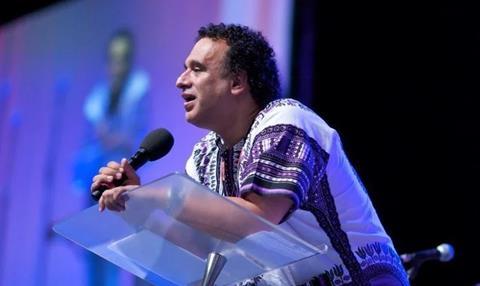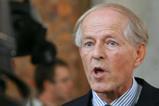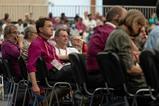As the Scolding Report reveals institutional failings and warns of a culture of silence, Andrew Graystone says it’s time for church leaders to speak to those who have been hurt by Soul Survivor and its founder’s actions

When the scandal surrounding Mike Pilavachi, founder of Soul Survivor, started to emerge into the public eye in April 2023, it was because a small number of people found the courage to speak publicly about their experiences. Some had suffered directly at the hands of Pilavachi.
One of the horrific themes to emerge from the independent review into the culture and practices of Soul Survivor, conducted by barristers Fiona Scolding KC and Ben Fullbrook, is that very senior figures in Soul Survivor festival, the church in Watford and the wider Church of England had been told about Pilavachi’s inappropriate behaviour as long ago as 2004, but failed to stop him.
In their documentary, Let There be Light, worship leader Matt Redman and his wife Beth recalled approaching a “senior leader” at a church in London, only to be told: “That’s just Mike: nothing will be done.” Shortly after the Redmans spoke out, brothers Tim and Pete Hughes, both prominent church leaders who were also part of Pilavachi’s youth group, released a statement on social media. When they had raised concerns regarding Pilavachi’s behaviour with Soul Survivor trustees in 2004, their “concerns were not taken seriously”, they said, and relationships soon broke down.
Perhaps people were too busy to get involved in a messy safeguarding issue. Perhaps they too were afraid of Pilavachi’s powerful position. Perhaps they thought that the success of Soul Survivor in attracting young people was worth a few casualties. Or perhaps they thought that it and its charismatic leader were too big to fail. Whatever the reasons, numerous very senior Christian leaders decided to walk by on the other side.
Generational impact
Without minimising the impact on those who had direct experience of Pilavachi’s abuse, we need to recognise that what has happened goes far wider. Over the course of two decades, hundreds of thousands of young people around the world have attended Soul Survivor festivals, read Pilavachi’s books or heard him speak.
Many will still feel that their experience remains foundational to their Christian faith. For others, their faith has been shaken by what they have learned over the past months. Others will not be able to square the revelations about Pilavachi’s naivety, immaturity and confused sexuality - as defined by the Scolding Review - with an ongoing commitment to Christian faith.
A whole generation of young evangelical Christians now has to work out what can be salvaged from the teaching and ecstatic experiences of Soul Survivor, and what has to be left in the spiritual scrapyard.
The idea that all churches are places of healing simply isn’t good enough for the time we are in
We also need to remember that the Pilavachi news comes in the context of many other high-profile cases of alleged abuse. We are still awaiting the Church of England’s review of its handling of John Smyth QC, who abused young men in the UK and Africa from 1980 to 2017. Next year will see the trial of Chris Brain, leader of the Nine O’Clock Service, who is facing 34 counts of sexually abusing women. In the very same week, we expect the trial of Rev Jonathan Fletcher, the eminence grise of Anglican conservative evangelicalism, who is facing nine charges of sexual assault.
Evangelical Christianity is being stress tested by a stream of revelations and allegations concerning recent and non-recent abuse. And it is not only the men and women who have been personally subjected to that abuse who have been rocked to their foundations by what is emerging, but hundreds of thousands of ordinary believers, too.
For us, there are only three possibilities: We can abandon our faith as a busted flush; we can stick our fingers in our ears and pretend nothing has happened; or we can take the difficult route of working out how we can incorporate the experience of leadership failure into our faith.
Silence that shames
Who will shoulder the pastoral responsibility of supporting his bruised followers? There are few people who have the trust and confidence of Pilavachi’s audience, but there are some. So far, the response of most of these high-profile church leaders has been woefully inadequate.
At a public meeting in February 2023, Rev Nicky Gumbel, former leader of Holy Trinity Brompton (HTB), shared a platform with Pilavachi and paid him fulsome tribute. “Mike, we owe you so much”, he said. Speaking about his former leadership of HTB, he went on: “We had about 25 clergy, and at one of our meetings we said: ‘What is the main reason, humanly speaking, that all of you are ordained and on the staff here?’ And practically every person in the room said the main reason is Soul Survivor and the influence of Mike and Soul Survivor over all these years.”
Those Christian leaders - and there are hundreds of them - whose ministries are built on foundations laid by Pilavachi, Fletcher, Brain or Smyth, are owed mature theological and pastoral explanations as to how this has happened. So are the thousands of young people whose faith has been shaken.
What they got from Gumbel, posted on X on the same day that the Scolding Review was published, was a feel-good motto: “Churches are not museums that display perfect people. They are hospitals where the wounded, hurt, injured and broken find healing.” The idea that all churches are places of healing simply isn’t good enough for the time we are in.
Binding up the broken hearted
The Diocese of St Albans is the CofE body that hosted Soul Survivor church, and was responsible for the rushed ordination of Mike Pilavachi in 2013. They released a statement, with no name attached to it, which welcomed the review, and said: “We deeply regret the pain and distress caused, and we offer our sincere apologies to all survivors and victims who have suffered as a result”.
So much is missing in this response from the bishop who authorised and oversaw this mess. For a start, the implication is that only those who were harmed directly by Mike Pilavachi deserve apology. Who will provide the theological or pastoral bandages to treat the wounds of the great mass of hurting and disillusioned Christians?
Evangelical Christianity is being stress tested by a stream of revelations of recent and non-recent abuse
Most Rev Justin Welby, Archbishop of Canterbury, is another hugely respected figure in the Soul Survivor community. In 2016, he spent two days at the festival, at one point wading into the crowd to have thousands of hands laid on him in prayer. Welby was a friend and admirer of Pilavachi, saying in 2020 - as he presented him with the Lambeth Award for “outstanding contributions to evangelism and discipleship amongst young people” - that he had ”shaped a spirituality and discipleship for generations of young people”.
When the award was revoked in July this year following an online petition, a short three-line statement was posted on Archbishop Justin’s website. Could Welby perhaps fill the role of pastor to hurting and confused Christians, and explain what shape their spirituality and discipleship might take going forwards?
There is a story in Luke’s Gospel which we often call The Parable of the Good Samaritan. In it, Jesus tells the tale of a man who was beaten up by robbers on the road from Jerusalem to Jericho. A priest and a Levite see the man suffering on the side of the road but, for their own reasons, they ignore him.
Then a Samaritan picks the man up and cares for him. Jesus doesn’t refer to him as a ‘good Samaritan’. He’s just a Samaritan. After all, caring for people who have been harmed is what any normal person would do.
And as for a priest - well of course they would stop and intervene, wouldn’t they? If Jesus were to give this story a name, I suspect it would be The Parable of the Bad Priests.





































3 Readers' comments